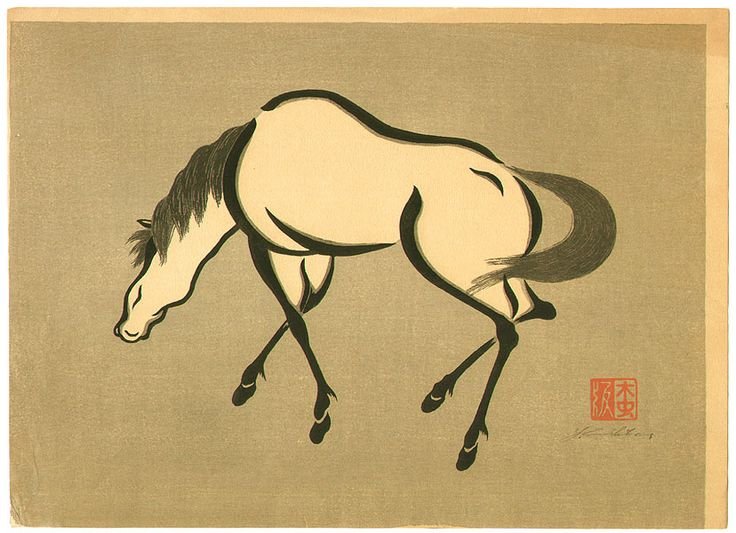Horse Poop ~ Haiku of Japan
Leave it to Issa to give us this slice of life from back in the day.
yūgure ya ma-guso no te wo mo kiku de fuku
wiping horse poop from my hand
using a chrysanthemum
—Issa


Not a whole lot to say here. What you see is what you get. This haiku does actually fit quite well with the entire haikai movement, one of the goals of which was to get away from the lofty images of old poetry and better reflect real life—to be more raw in other words. Even the great Bashō had at least one haiku about animals being animals.
From his epic Oku no Hosomichi trip, Bashō wrote:
nomi shirami uma no shitosuru makura moto
now a horse pissing
near my pillow
Real life, eh?
Having said that, if you want to really try to read something into Issa's haiku, he could be making some comment on the imperial house, whose crest is a chrysanthemum. If that were the case, I doubt he would be saying he disapproves of them, rather that the military government (the shogunate) is treating them badly.
I don't know if that's the case here, however. Issa didn't often make political comments. But then again, I could be wrong. He wrote over 20,000 haiku in his lifetime and I haven't read even a fraction of them all.
Or it could be a simpler statement that as beautiful as a chrysanthemum is, it is only a thing and can be used for other purposes. Instead of making a value judgement of poop or flower we should just appreciate them for what they are. The Buddha is just as comfortable sitting in a pile of shit as he is on a quiet mountain.
What do you think?
Chrysanthemum (kiku) is a season word for all of autumn, by the way, which is the season we are currently in according to the traditional calendar.
❦


 |
David LaSpina is an American photographer and translator lost in Japan, trying to capture the beauty of this country one photo at a time and searching for the perfect haiku. |
If this blog post has entertained or helped you, please follow/upvote/reblog. If you want to further support my writing, donations are welcome.
That is, me! If you like this translation, feel free to use it. Just credit me. Also link here if you can. ↩
I believe I have seen this haiku from Issa before somewhere, maybe from one of your previous blogs. But I never thought it could be read like: Chrysanthemum is just the crest of imperial house. Issa was trying to express his disapproval at the shogunate! If so, this haiku becomes so meaningful and intriguing which I would love so much!
Oh, I posted another comment on your blog: Today in Japan Sep 11 ~ More Drama From the Shogunate!
I wish I could get the accurate answer from you!
Please watch this vedio clip:
https://v.douyin.com/6yD8cry/
Thank you for your upvoting my comment so much, dear @bdvoter! It is such a big suprise to me to get 1.34 dollar from you. I'm only rather curious which words of my comment have touched you. Or is it due to my video link about Amway China and American President Bush?Who says that China and US are not on the good times?Just see the invisibly intimate and sweet relationship between China and US through the great Amway company which is esoteric!
I find it difficult to understand Japanese haiku especially when I don't know what the things mentioned represent. Horse, I think represents power... and poop, is something unclean. So he's cleaning the dirt of those in power using the Imperial Crest? Is the military and imperial palace separate during this era??? Enlighten me... haha
Gorgeous. You inspire me to write a Haiku too. Maybe next time. Thank You.
I do not really know Issa's work but I think it could ba an expression of the fatalistic way of thinking, the "しかたがない".
I understand it as "shit happens, but life goes on so just deal with it the best you can".
But there can be a lot more depth to it of course...